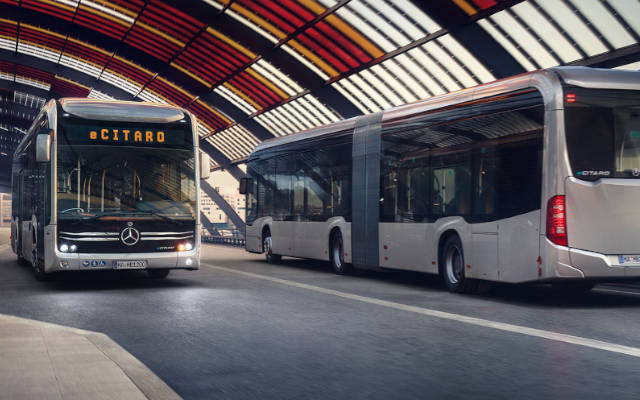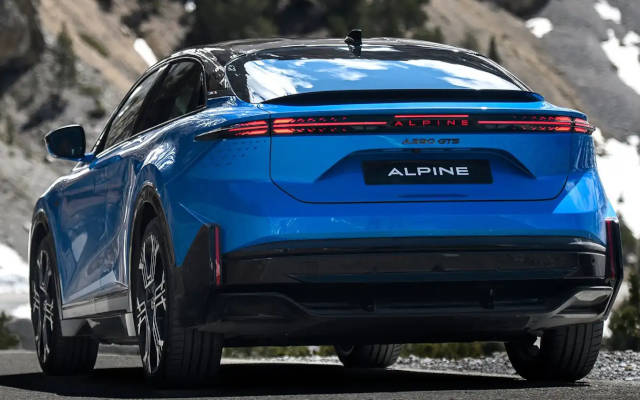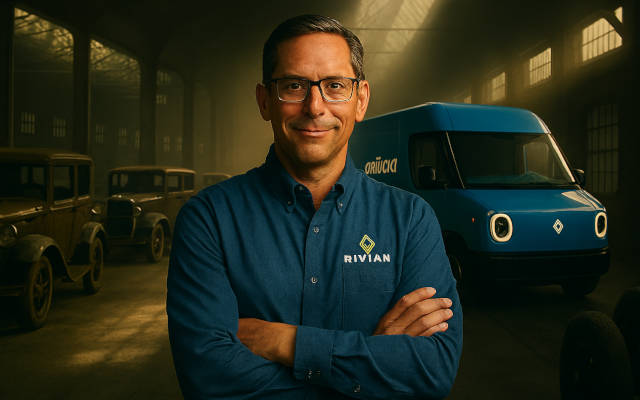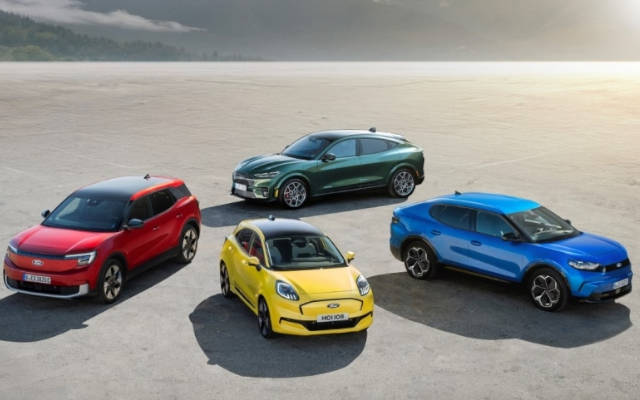 EDITOR'S PICK
EDITOR'S PICK
Mercedes-Benz eCitaro: The Electric Bus Redefining European Public Transit
26 Aug 2025 | Synopsis
 The Mercedes-Benz eCitaro is a leading European electric bus, evolving from a battery-only model to include a hydrogen fuel cell range extender. This dual strategy allows for strategic deployment: battery models for short city routes and fuel cell versions for long, demanding ones. This flexibility is key to its success in helping cities transition to zero-emission public transport.
The Mercedes-Benz eCitaro is a leading European electric bus, evolving from a battery-only model to include a hydrogen fuel cell range extender. This dual strategy allows for strategic deployment: battery models for short city routes and fuel cell versions for long, demanding ones. This flexibility is key to its success in helping cities transition to zero-emission public transport.Renault Races Past Hydrogen with All-Electric Alpine Flagship
26 Aug 2025 | Synopsis
 Renault signals a bold pivot beyond hydrogen with Alpine's 470 hp electric 390 GTS. High hydrogen costs, poor infrastructure, and energy inefficiency drive the move toward scalable EVs. Unveiled by Renault and Alpine, the GTS blends luxury, performance, and national pride - boasting 345-mile range, premium design, and an "overtake" boost. It's a clear statement: France sees electrification as the future of high-performance mobility.
Renault signals a bold pivot beyond hydrogen with Alpine's 470 hp electric 390 GTS. High hydrogen costs, poor infrastructure, and energy inefficiency drive the move toward scalable EVs. Unveiled by Renault and Alpine, the GTS blends luxury, performance, and national pride - boasting 345-mile range, premium design, and an "overtake" boost. It's a clear statement: France sees electrification as the future of high-performance mobility.Rivian CEO Says It 'Blows My Mind' That The US Auto Industry Is Reprioritizing Capital Toward Gas-Powered Vehicles
26 Aug 2025 | Synopsis
 Rivian CEO RJ Scaringe criticized continued U.S. investment in internal combustion engine (ICE) vehicles, calling it a strategic mistake. He argued that pouring billions into gas-powered platforms delays progress and risks falling behind global EV leaders. Scaringe emphasized that electrification is inevitable and that legacy automakers must pivot faster to remain competitive in a rapidly shifting market.
Rivian CEO RJ Scaringe criticized continued U.S. investment in internal combustion engine (ICE) vehicles, calling it a strategic mistake. He argued that pouring billions into gas-powered platforms delays progress and risks falling behind global EV leaders. Scaringe emphasized that electrification is inevitable and that legacy automakers must pivot faster to remain competitive in a rapidly shifting market.Electric Aviation's Summer Surge: Startups, Certification, and the Race to Redefine Flight
25 Aug 2025 | Synopsis
 Electric aviation is accelerating as startups like Joby, Archer, Ampaire, and ZeroAvia push toward FAA certification and commercial launch. New FAA rules streamline approval for powered-lift aircraft, while propulsion strategies—battery, hybrid, and hydrogen—diversify range and infrastructure needs. Despite regulatory hurdles, investor confidence and airline partnerships signal that 2025 may be the breakout year for sustainable flight.
Electric aviation is accelerating as startups like Joby, Archer, Ampaire, and ZeroAvia push toward FAA certification and commercial launch. New FAA rules streamline approval for powered-lift aircraft, while propulsion strategies—battery, hybrid, and hydrogen—diversify range and infrastructure needs. Despite regulatory hurdles, investor confidence and airline partnerships signal that 2025 may be the breakout year for sustainable flight.Ford Is A Bellwether: Electric Vehicles Are Coming, Despite Policy Shifts By Oil Bought-Off American Presidency
25 Aug 2025 | Synopsis
 Despite Trump's rollback of EV incentives and emissions rules, Ford is doubling down on electrification. It announced a $5B investment in a modular EV platform and a sub-$30K electric pickup by 2027. Driven more by Chinese competition than U.S. politics, Ford aims to streamline production and stay globally competitive. EV sales remain strong outside Tesla, and legacy automakers are shifting toward affordable models and lithium iron phosphate batteries.
Despite Trump's rollback of EV incentives and emissions rules, Ford is doubling down on electrification. It announced a $5B investment in a modular EV platform and a sub-$30K electric pickup by 2027. Driven more by Chinese competition than U.S. politics, Ford aims to streamline production and stay globally competitive. EV sales remain strong outside Tesla, and legacy automakers are shifting toward affordable models and lithium iron phosphate batteries.
 EVWorld Exclusive
EVWorld Exclusive
Unlocking Heat's Hidden Potential: How a Nanoscale Discovery Could Transform Everyday Tech
24 Oct 2025 |  A recent nanoscale physics breakthrough reveals heat can transfer across tiny gaps far more efficiently than expected - up to 100 times greater than classical predictions. This could revolutionize cooling and energy systems in electronics, EVs, and smart appliances. While engineering challenges remain, early applications may emerge within 3-5 years, with broader consumer adoption possible in the next decade. The future of heat management may be silent, solid-state, and radically efficient.
A recent nanoscale physics breakthrough reveals heat can transfer across tiny gaps far more efficiently than expected - up to 100 times greater than classical predictions. This could revolutionize cooling and energy systems in electronics, EVs, and smart appliances. While engineering challenges remain, early applications may emerge within 3-5 years, with broader consumer adoption possible in the next decade. The future of heat management may be silent, solid-state, and radically efficient.
Turning the Energy Crunch into a Smart Grid Revolution
24 Oct 2025 |  America's energy crunch is not about supply - it's about coordination. Virtual power plants and vehicle-to-grid systems offer a scalable, software-driven solution to rising demand from AI, EVs, and climate volatility. By turning homes, vehicles, and businesses into active grid assets, and aligning policy with technology, the U.S. can build a smarter, more resilient energy future without building more power plants. The tools exist - now it's time to connect them.
America's energy crunch is not about supply - it's about coordination. Virtual power plants and vehicle-to-grid systems offer a scalable, software-driven solution to rising demand from AI, EVs, and climate volatility. By turning homes, vehicles, and businesses into active grid assets, and aligning policy with technology, the U.S. can build a smarter, more resilient energy future without building more power plants. The tools exist - now it's time to connect them.
Auto Retail in 2025: Bridging the Trust Gap Between Dealers and Buyers
24 Oct 2025 |  The 2025 Urban Science and Harris Poll report reveals a growing disconnect between dealers and buyers. While dealers embrace EVs, AI, and digital tools, many buyers remain cautious - especially about full electrification and online-only retail. Brand loyalty is weakening, and policy clarity is key to adoption. The future of auto retail depends on bridging trust, flexibility, and infrastructure gaps.
The 2025 Urban Science and Harris Poll report reveals a growing disconnect between dealers and buyers. While dealers embrace EVs, AI, and digital tools, many buyers remain cautious - especially about full electrification and online-only retail. Brand loyalty is weakening, and policy clarity is key to adoption. The future of auto retail depends on bridging trust, flexibility, and infrastructure gaps.
Electric Icons in the Making: Audi Concept C vs. Chevrolet Corvette EV
23 Oct 2025 |  Audi's Concept C previews a refined electric GT built on the mature PPE platform, likely arriving by 2026. Chevrolet's Corvette EV promises supercar performance but faces packaging and thermal challenges. Audi is closer to production; Corvette remains in early development. Both reflect divergent strategies in electrifying legacy sports cars, with Audi emphasizing platform maturity and Chevrolet pursuing brand continuity through engineering innovation.
Audi's Concept C previews a refined electric GT built on the mature PPE platform, likely arriving by 2026. Chevrolet's Corvette EV promises supercar performance but faces packaging and thermal challenges. Audi is closer to production; Corvette remains in early development. Both reflect divergent strategies in electrifying legacy sports cars, with Audi emphasizing platform maturity and Chevrolet pursuing brand continuity through engineering innovation.
Electrification Is Not an Oversimplification
23 Oct 2025 |  Despite critiques that the quest for global electrification is "simplistic", the transition is strategic and necessary. Grid upgrades, battery innovation, and tailored policies make electrification viable. Sodium-ion batteries and recycling reduce material risk. Compared to fossil fuels, electrification offers cleaner, safer, and more resilient systems. Complexity demands better design - not delay.
Despite critiques that the quest for global electrification is "simplistic", the transition is strategic and necessary. Grid upgrades, battery innovation, and tailored policies make electrification viable. Sodium-ion batteries and recycling reduce material risk. Compared to fossil fuels, electrification offers cleaner, safer, and more resilient systems. Complexity demands better design - not delay.
 27 Oct 2025 02:02:17 UTC |
RECENT PODCASTS
What Battery Chemistry Wins - Ontario Nuclear Investment - Battery Storage Boom
SEARCH RSSTREAM
 34 New Postings In Past 24 Hours
34 New Postings In Past 24 Hours
Category:policy
Region:NoAmerica
Date:26 Oct 2025
Category:review
Region:Europe
Date:26 Oct 2025
Category:mobility
Region:AsiaPacific
Date:26 Oct 2025
Category:mobility
Region:AsiaPacific
Date:26 Oct 2025
Category:mobility
Region:Europe
Date:26 Oct 2025
Category:mobility
Region:Europe
Date:26 Oct 2025
Category:energy
Region:NoAmerica
Date:26 Oct 2025
Category:autonomy
Region:NoAmerica
Date:26 Oct 2025
Category:mobility
Region:Europe
Date:26 Oct 2025
Category:energy
Region:IndoAsia
Date:26 Oct 2025
Category:energy
Region:Global
Date:26 Oct 2025
Category:mobility
Region:NoAmerica
Date:26 Oct 2025
Category:energy
Region:NoAmerica
Date:26 Oct 2025
Category:mobility
Region:AsiaPacific
Date:26 Oct 2025
Category:energy
Region:NoAmerica
Date:26 Oct 2025
Category:mobility
Region:NoAmerica
Date:26 Oct 2025
Category:finance
Region:NoAmerica
Date:26 Oct 2025
Category:energy
Region:AsiaPacific
Date:26 Oct 2025
Category:mobility
Region:NoAmerica
Date:26 Oct 2025
Category:mobility
Region:AsiaPacific
Date:26 Oct 2025